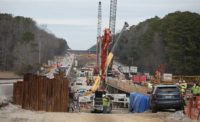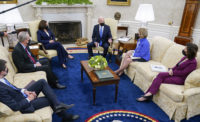President Joe Biden, trying to keep his new infrastructure agreement with a bipartisan Senate group on track, has pulled back on rhetoric explicitly tying his support of the public works package with passage also of a much larger measure dealing with education, child care and other social programs.
In a statement released on June 26—just two days after the deal on the infrastructure outline was announced—Biden said he didn't intend to leave the impression he was threatening to veto the infrastructure bill.
What prompted the changeover was Republicans' negative reactions to Biden’s comments in a June 24 briefing just hours after the deal on a physical infrastructure framework was announced. The comments conditioned his approval of the infrastructure measure with final congressional action on the other package, which Biden calls the American Families Plan.
In his remarks, Biden had said that if the infrastructure bill “is the only thing that comes to me, I’m not signing it.” He added that legislation that would stem from the bipartisan physical infrastructure deal should be done “in tandem” with the other bill, which the president has said focuses on "human infrastructure."
ACEC study: Plan would boost A-E sector 6% over five years
Neither proposal has been drafted yet. The physical infrastructure framework calls for $973 billion over five years and $1.2 trillion over eight years. But the "new money" portion of those totals would be $579 billion. It includes allocations for highways, transit, rail, water, electric power and other infrastructure programs.
[View 6/24/2021 story on the infrastructure agreement here.]
If enacted, the infrastructure framework would provide a significant jobs boost to the engineering and design field and aid the U.S. economy overall, according to a new American Council of Engineering Companies' study.
The report estimates that the deal would create more than 82,000 full- and part-time architectural-engineering jobs and generate $62 billion in A-E wages. It also would add $75 billion to the Gross Domestic Product.
In addition, the study says the plan would result in a 6% average annual increase in engineering and design services business and lift the sector's annual output to $416 billion in 2026, from $352 billion in 2021, an 18% increase.
The Biden June 24 statement triggered highly critical comments from Senate Minority Leader Mitch McConnell (R-Ky.). McConnell said shortly after the press conference, “Less than two hours after publicly commending our colleagues and endorsing the bipartisan agreement, the president took the extraordinary step of threatening to veto it.”
McConnell added, "It almost makes your head spin. An expression of bipartisanship, and then an ultimatum on behalf of your left-wing base.”
Biden says veto not his 'intent'
In the wake of Republican criticism, Biden issued a new statement on June 26, acknowledging that his earlier comments "understandably upset some Republicans" and "also created the impression that I was issuing a veto threat on the very plan I had just agreed to, which was certainly not my intent.”
Biden said, "The bottom line is this: I gave my word to support the Infrastructure Plan, and that’s what I intend to do. I intend to pursue the passage of that plan, which Democrats and Republicans agreed to on Thursday, with vigor. It would be good for the economy, good for our country, good for our people. I fully stand behind it without reservation or hesitation."
There are indications that some Republicans are assuaged.
Sen. Rob Portman (R-Ohio), a leader of the bipartisan group, said on ABC’s This Week show on June 27, “I was very glad to see the president clarify his remarks, because it was inconsistent with that everything we had been told all along the way.”
Portman also said, “We were all blindsided by the comments the previous day, which were that somehow these two bills were connected….”
He added that "it's very clear that we can move forward with a bipartisan bill that's broadly popular not just among members of Congress but the American people."
Another member of the Senate group, Bill Cassidy (R-La.), said on NBC’s Meet the Press that if the agreement is able to hold, he thought McConnell would support it.
Cassidy said, “If we can pull this off, I think Mitch will favor it.”
He added, "Now he doesn’t like the president throwing the wrench in there, saying, 'Listen, the two [bills] are tied together,'—that's not what we were told."
Cassidy said, "I think Mitch McConnell wants infrastructure as much as anyone else. He wants the jobs that this’ll create. I think Leader McConnell will be for it if it continues to come together as it is."
The physical infrastructure framework, once it is turned into legislative language, is expected to move through Congress in a conventional way, with input from various committees.
But the human infrastructure measure is expected to be a partisan product that Democrats would seek to advance via the budget reconciliation mechanism.
That process would permit Democrats to move the bill through the Senate with a simple majority, rather than the 60-vote level needed to block a filibuster.
Story updated on 6/28/2021 with new ACEC study of framework's economic impact.





Post a comment to this article
Report Abusive Comment